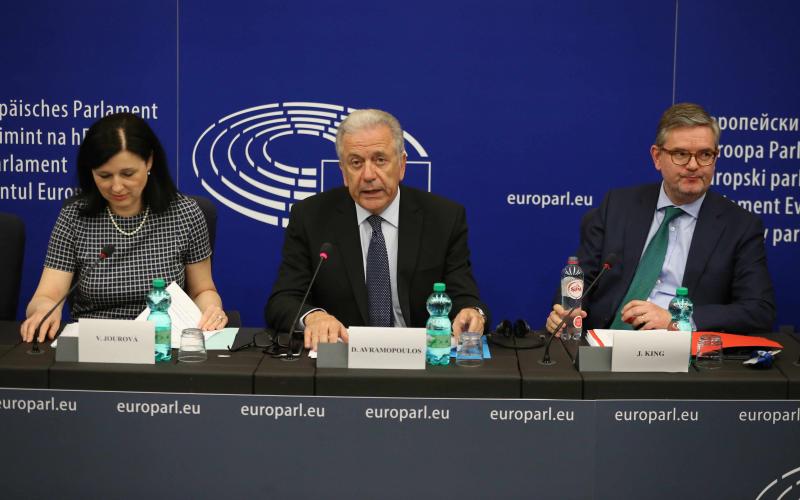Dear all,
The threats to our security in Europe but also globally are not waning. Terrorists and criminals are quick in changing strategies and using new tools to try and harm us – but today we show that we are quicker, smarter and more resilient.
Over the past two years we have been gradually adding strong, sturdy and tangible building blocks towards a genuine and effective Security Union. All our efforts are equally important and interlinked: stronger external borders, facilitating information exchange, beefing up the resilience and protection of our public spaces, protecting our citizens online, and more efficient judicial, law enforcement and administrative cooperation overall.
Today, we adopt another set of very concrete tools to be one step ahead in the game, thereby further tightening the screws until there is no more space for terrorists or criminals to operate in and no means to carry out attacks.
After all the attacks we suffered, and the challenge we face from returning foreign terrorist fighters, it is no longer acceptable that today more than 88 million EU citizens, in 3 Member States, are using paper ID cards, not just in their daily life but also to travel with them across our external border. The systematic checks for EU citizens that we have put in place at our external borders, together with the proposed interoperability of our information systems rely heavily on the use of biometric data. This is why today we propose that within two years all paper cards are phased out, and that within five years, all national ID cards contain a chip which stores a biometric image and two fingerprints. No criminal or terrorist should be able to hide behind fake ID cards anymore.
In addition, after Paris, Brussels, Manchester, London, there is no doubt that it is urgent to take action against home-made explosives. These home-made explosives are built from chemicals that anyone can buy from any hardware store or online. You can all search for sulphuric acid, or acetone, or ammonium nitrate online. This is what you would need to cook TATP in your garage – the explosive of choice for terrorist attacks lately, and the cause for the largest number of victims in recent years. With today’s measures, we propose not only to ban certain substances from being available in your local hardware store or online, but also that before issuing a license to an individual to buy restricted substances, each Member State will have to verify the legitimacy of such a request and run a careful security screening, including a criminal record check. Business will also be obliged to report a suspicious transaction to the responsible authorities within 24 hours.
In parallel, we are also recommending to Member States today to improve their procedures regarding the import and export of firearms, and to make sure that these do not fall in the wrong hands. Member States should make use of systematic background checks, mark and identify the firearms as well as improve information exchange.
Finally, today we also propose to provide law enforcement authorities with modern tools to obtain electronic evidence for the investigation and prosecution of crimes, including terrorism and cybercrime. We also propose measures to allow law enforcement authorities’ timely access to financial information necessary for investigations related to terrorism and criminal activities. My colleagues Vera and Julian will give you more information about these proposals.
As I said in the beginning: all our efforts are interconnected. And all of the measures that we have taken so far have not only contributed to a more secure European Union for our citizens, but also helped us fight the threats of terrorism and organised crime in our immediate region and globally.
Thank you.

